This installment of The David Pakman Show newsletter is free for everyone. I send these daily. If you’d like to receive it, join the newsletter today. Biden has aggressive cancer, MAGA conspiracy EXPLODESFormer President Joe Biden has been diagnosed with aggressive, metastatic prostate cancer (Gleason 9), which may be manageable with hormone-sensitive treatment. Donald Trump issued a relatively normal statement, but MAGA figures quickly spread baseless conspiracy theories claiming the illness was long hidden. Experts note prostate cancer can progress quickly in older men, making such claims medically unfounded. Trump Middle East trip raises mental health concernsDuring a Middle East trip, Donald Trump gave several rambling speeches that raised fresh concerns about his mental fitness. In Qatar, he spoke incoherently about drones, trees, and a “world champion” lumberjack. In Abu Dhabi, he went on about grocery prices and Easter eggs. Such behavior would be a major story for any other president, but much of the media is ignoring it. From over the weekend: SHOCK: RFK says DON’T take medical advice from himAt a House hearing, HHS Secretary Robert F. Kennedy Jr. repeatedly dodged direct questions about whether he would vaccinate his children, despite having built his public reputation on vaccine-related medical advice. When pressed, he claimed people shouldn't take medical advice from him, an ironic stance given his long history of doing exactly that. Lawmakers challenged his evasiveness, especially given his role overseeing public health guidance. From over the weekend: OH NO: Republican opens the door to CIVIL WARIn a Meet the Press interview, Senator John Barrasso repeatedly refused to say whether he would oppose suspending habeas corpus—a constitutional protection against indefinite detention without trial—which Trump allies are reportedly considering. Despite being asked three times, Barrasso dodged the question, claiming it likely wouldn’t come before Congress. His noncommittal stance raises alarm, as it suggests complicity or indifference toward a possible authoritarian move. (SEN. JOHN BARRASSO R-WY IS A PHYSICIAN) More on the show: — Audio from Biden’s deposition leaks, right-wing media erupts with claims of dementia based on five selective minutes — Conservative lawyer John Yoo says Trump’s plan to suspend habeas corpus would be stronger grounds for impeachment than either of the first two — Mike Pence criticizes Trump’s tariffs, gifts from Qatar, and violations of the Emoluments Clause — Trump lashes out at Bruce Springsteen for criticizing him abroad and suggests there could be consequences when he returns — Trump stumbles through a Fox News interview, calls nuclear weapons “the N-word,” brags about oil quality, and defends accepting a $400 million jet — Trump spirals on Truth Social with posts about the Autopen, Walmart, and rigged elections -- On the Bonus Show: Mexican ship crashes into Brooklyn Bridge, Trump DOJ considers making it easier to indict members of Congress, more than 2,000 Starbucks baristas strike over new dress code, much more... |
Search This Blog
Monday, May 19, 2025
Biden has cancer, Trump threatens Bruce Springsteen
Saturday, February 5, 2022
RSN: Garrison Keillor | In Georgia, Taking Shelter From the Storm
February Is Short, a Quick Start Will Be Essential
February is an uphill struggle right out of the gate. We have to find a way to accomplish in 28 days what normally takes us 30 or 31 days. Urgency matters!
The next few days will set the tone for the entire month. 500,000 people vill visit RSN this month. If “500” donate we’ll be fine.
You, not someone else.
Marc Ash
Founder, Reader Supported News
If you would prefer to send a check:
Reader Supported News
PO Box 2043 / Citrus Heights, CA 95611
Follow us on facebook and twitter!
Live on the homepage now!
Reader Supported News
I got up from breakfast at the hotel and passed a table with two couples eating breakfast and one man said, “How you all doing?” and I said, “Never better,” and I commented on the fact I’d seen a number of extremely tall young men coming into the hotel and he told me there was a college basketball tournament over at the University of Western Georgia a few blocks away. We discussed what it must be like to be six-eight or six-ten and on the court you need to be aggressive and rangy, but walking around indoors you feel constrained and you keep bumping your head and the bed is too short. One of the women said, “You see one of those giants trying to fold himself up and get into a car, it makes me grateful to be short and fat.” Up north, I all wouldn’t have been asked that question, and this small friendly exchange wouldn’t happen.
Carrollton is a comfortable place with a handsome old downtown around a square and stately churches and an arts center and the cooking at the Brown Dog café reminded me of my mother’s, but it was the ease of striking up conversation that touched my heart. I come from Minnesota, the land of stoical Scandinavians, men of few words, and if you go to a Lutheran church, the hand-shaking is highly selective and a visitor may leave unshaken and unspoken to.
Sunday I walked into the Brown Dog and passed a table and a man reached out and took my arm and stood up and said, “I got to tell you that your pants are unzipped.” I fixed the problem and thanked him and he noted my accent and one thing led to another and his wife invited me to join them for lunch so I did. He was my age, she was younger, she grew up in Chicago, and he grew up in Georgia.
I ordered ham and grits and collard greens. “Ham is a good choice,” he said. “They can’t hurt ham, no matter what they do.” She was an English teacher and he was retired, formerly in the construction business. He was the son of a sharecropper: “Worst way to earn a living that there ever was.” He picked cotton as a child. “I had to be someplace so they figured I might as well be in the field.” They sent him to the house to see what time it was and he couldn’t read a clock but he told them where the hands were pointing. The family ate squirrel and rabbit with grits and gravy. His best friend was a boy so black they called him Blue. “We’d go to a café for a Coke and he had to go in the back door if they’d let him in at all. I knew it wasn’t right.” He was ten when his family moved to California, his dad got a regular job, and they got a house with indoor plumbing.
I’d known him for all of forty-five minutes and I got a whole story, which goes to show that in the right town, which Carrollton is, it may be worthwhile to let your pants be unzipped. “You can’t erase history,” he said, “but we are all brothers under the skin,” and I certainly felt brotherly toward him and the others I had met, even the seven-footers. And I am done looking down on the South. We have our history up north too and it’s not all shiny. And I do believe in the beauty of small talk. Thanks for reading this, I do appreciate you, all of you.
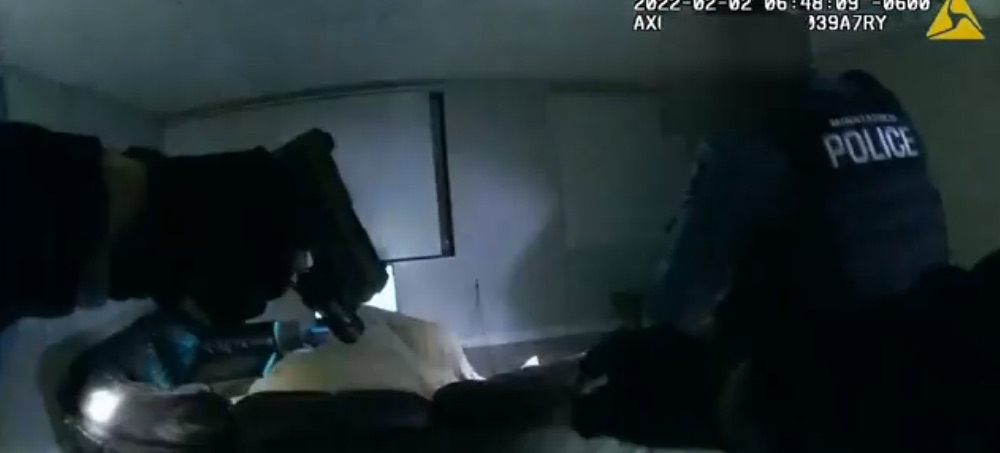 Minneapolis police killed 22-year-old Amir Locke, who was sleeping on the couch, in a no-knock raid. (photo: Minneapolis PD)
Minneapolis police killed 22-year-old Amir Locke, who was sleeping on the couch, in a no-knock raid. (photo: Minneapolis PD)
ALSO SEE: Minnesota Mulls Criminal Charges Against SWAT Officer
Who Killed Amir Locke
In the seconds that followed, a Black man apparently asleep and shown to be holding a gun upon awakening was shot and killed. Police say he was not named in any search warrants before the entry, and attorneys for the man's family say he was in legal possession of his firearm.
Hennepin County Attorney Mike Freeman announced Friday that he asked Minnesota Attorney General Keith Ellison to join in his review of the shooting. Ellison's office has agreed, according to Freeman's office.
"We will be working with the Minnesota Bureau of Criminal Apprehension to ensure a thorough and complete evaluation," Freeman said in a statement. "Thereafter we will decide together, based on the law and evidence, whether criminal charges should be brought."
The fatal shooting brings further scrutiny to the use of no-knock warrants and shines a spotlight on a police department that has faced criticism before.
In May 2020, Minneapolis Police Department officers were involved in the killing of George Floyd before later being fired and charged in his death. The subsequent national outrage over the killings of Floyd and Breonna Taylor -- who was shot by police in Kentucky as they performed a no-knock warrant entry -- led to sustained protests and calls for policing reform.
That summer, Minneapolis announced a new policy on no-knock entries, aimed at limiting the "likelihood of bad outcomes." Officials said that officers would be required to announce their presence and purpose before entering, except in certain circumstances like hostage situations.
Taylor's death also prompted other cities across the country to move to ban or rein in no-knock, forcible-entry raids.
Family attorneys and the city have identified the man who was shot Wednesday and later died as Amir Locke. He was not named in the original search warrant, police said.
Jeff Storms, one of the Locke family attorneys, echoed those findings to CNN.
"To the best of my knowledge, he was not named in any of the search warrants," he said. "He was not even a target."
Storms added, "The City of Minneapolis told the public that it was limiting the use of no-knock warrants to 'limit the likelihood of bad outcomes.' Less than two years later, Amir Locke and his family needlessly suffered the worst possible outcome. Our City has to do better."
Minneapolis officers were executing the warrant tied to a homicide investigation in nearby St. Paul, according to Minneapolis police.
"At this point, it's unclear if or how he (Locke) is connected to St. Paul's investigation," said Interim Minneapolis Police Chief Amelia Huffman during a press conference late Thursday.
"These events unfold in seconds but the trauma is long-lasting. A young man lost his life, and his friends and family are in mourning," said Huffman, describing it as a sobering moment.
Body camera video shows shooting
After police entered the apartment, officers quickly identified a man inside, body camera footage shows.
"Hands! Hands! Hands!" one officer yells while others yell "Get on the fu**ing ground!" as they make their way toward the back of a couch where a man is seen wrapped in blankets at 6:48 a.m., according to the footage. One officer kicks the back of the couch, appearing to wake up the man, who looks up to see the officers all around him.
He begins to try and stand up, still wrapped in blankets, and is seen holding a gun. Three gunshots are then heard from officers.
A screenshot provided by the police department from the body camera video shows the weapon more clearly.
"The involved officer was just outside the frame in the direction the barrel is emerging from the blanket," said Huffman.
Based on the short video and image provided, CNN is not able to independently confirm where the gun was pointing, but has requested body camera video from the other responding officers.
The video was released at multiple speeds -- one version in real time, the other two edited by the city to be slowed down. In total, 14 seconds elapse in real time.
"As they got close, you can see, along with an individual emerging from under the blanket, the barrel of a gun, which comes out from the blanket," said Huffman. "The officer had to make a split-second decision to assess the circumstances and to determine whether he felt like there was an articulable threat, that the threat was of imminent harm, great bodily harm or death, and that he needed to take action right then to protect himself and his partners."
The initial release from authorities said "officers encountered a male who was armed with a handgun pointed in the direction of officers."
Officer Mark Hanneman, as identified by the City of Minneapolis, then shot at and hit Locke. The police department says aid was immediately provided as the officers carried him down to the lobby to meet paramedics.
Locke was taken to the Hennepin County Medical Center where he died, according to the police.
Hanneman has been placed on administrative leave, as is policy, pending the ongoing investigation, a spokesperson for the City of Minneapolis said. CNN has attempted to reach Hanneman and has reached out to the Minneapolis Police Federation for comment but has not gotten a response.
"The Minnesota Bureau of Criminal Apprehension was notified immediately and is heading up the criminal investigation," Huffman said Wednesday.
A spokesperson for the St. Paul Police Department confirmed to CNN the homicide investigation that was the source of the original warrant is still active.
A gun was also recovered from the apartment, police said.
Benjamin Crump, another of the Locke family attorneys, said in a statement, "Locke, who has several family members in law enforcement and no past criminal history, legally possessed a firearm at the time of his death.
"Like the case of Breonna Taylor, the tragic killing of Amir Locke shows a pattern of no-knock warrants having deadly consequences for Black Americans," Crump said.
Taylor, a 26-year-old ER medical technician, was shot and killed by Louisville officers in her home during a botched police raid in March 2020.
A grand jury failed to indict any officers in her death. One officer, Brett Hankison, was indicted for blindly firing into a neighbor's apartment during the shooting. He has pleaded not guilty and trial proceedings are ongoing.
A virtual press conference with the Locke family and their attorneys is planned for Friday morning.
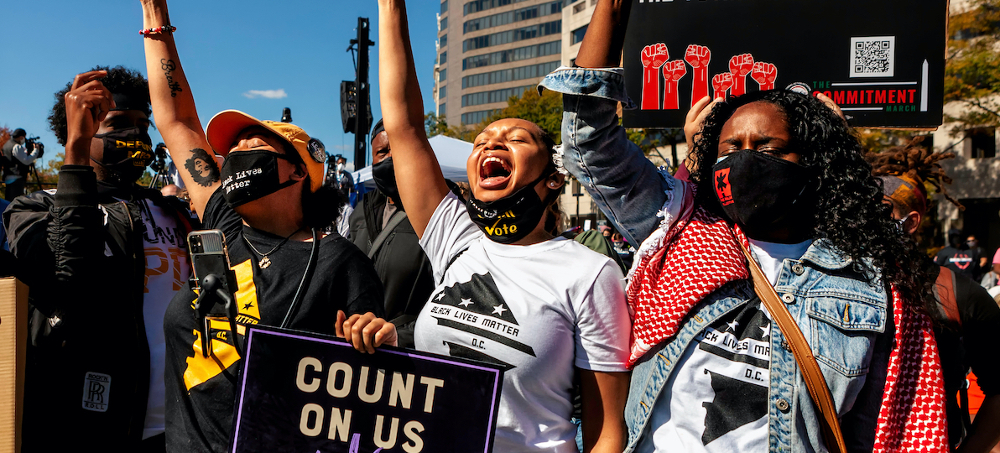 Judges gave the Alabama Legislature until Feb. 11 to draw a new map that "includes two districts in which Black voters comprise a voting-age majority." (photo: Shutterstock)
Judges gave the Alabama Legislature until Feb. 11 to draw a new map that "includes two districts in which Black voters comprise a voting-age majority." (photo: Shutterstock)
As a refresher, the U.S. Supreme Court ruled in 2019 that partisan gerrymandering was a political question that federal courts should not adjudicate. However, they can still hear cases relating to racial gerrymandering — i.e., whether a map discriminates against voters of a certain race. Alabama poses just such a question. Back in November 2021, Alabama’s Republican-controlled legislature passed a new congressional map that created six majority-white districts and just one majority-Black district. Civil-rights advocates sued, arguing that Black voters in the state were entitled to a second district under the Voting Rights Act, the landmark law that prohibits racial discrimination in voting.
Under Section 2 of the VRA, it’s illegal to deny members of a racial minority equal opportunity to elect representatives of their choice. This has been widely interpreted to mean that, when possible, states must draw congressional districts where nonwhite voters are the dominant voting bloc, so as to reasonably ensure they can elect their preferred candidate.
And as maps proposed by the plaintiffs demonstrated, it is readily possible to draw two predominantly Black congressional districts in Alabama. For example, in the plaintiffs’ illustrative plan A, the 2nd District’s voting-age population (VAP) is 50.0 percent Black, and the 7th District’s VAP is 50.3 percent Black.
While the VRA explicitly states that racial minorities are not automatically entitled to a number of seats proportional to their share of the population, Black people constitute more than 25 percent of Alabama’s VAP, much larger than the share of congressional districts they predominate in (14 percent). And many Black votes would have been wasted under the overturned map, with the majority-white 1st, 2nd and 3rd districts all having at least a 24 percent Black VAP.
As a result, the judges gave the Alabama Legislature until Feb. 11 to draw a new map that “include[s] two districts in which Black voters either comprise a voting-age majority or something quite close to it.” But by then, it’s possible that the judges’ decision will have been overturned anyway. Alabama has appealed the ruling to the Supreme Court, arguing that the map should be reinstated because a new one would disrupt preparations for the state’s upcoming primary and improperly prioritize race in redistricting.
The high court has yet to signal what it will do with the appeal. But the possibilities run a wide gamut: The case could lead to a very favorable outcome for liberals, a very favorable outcome for conservatives or anything in between.
On one end of the spectrum, the Supreme Court could let the lower court’s ruling stand, which would have the immediate impact of adding a new Black-opportunity congressional seat in Alabama. (In practice, this would also add one Democrat and subtract one Republican from Alabama’s congressional delegation.) It would also have ripple effects throughout the Deep South. If this ruling stands, it could inspire courts to create additional Black-opportunity districts in Louisiana and maybe South Carolina as well.
Currently, only one of Louisiana’s six congressional districts is predominantly Black, despite the state having one of the country’s largest Black population shares: more than 30 percent of the VAP. With the state’s redistricting process just getting underway this week, Democrats have already proposed multiple congressional maps that would add a majority-Black seat along the Mississippi River north of Baton Rouge. For example, under Senate Bill 4, the 2nd District would have a VAP that’s 51.5 percent Black and the 5th District would have a VAP that’s 50.5 percent Black.
Because Republicans control the Louisiana Legislature (and these maps would eliminate a Republican member of Congress), they may not be inclined to pass any of these maps. But Gov. John Bel Edwards is a Democrat, and he’s already come out in favor of a second predominantly Black district. Republicans also lack the numbers in the state House to override a potential veto (although they’d only need to convince two independents or conservative Democrats to side with them to do so). That means Louisiana redistricting will probably be decided by the local courts, which would likely follow the Supreme Court’s lead and greenlight a second Black-opportunity district — if that’s what the high court decides to do in Alabama.
Meanwhile, South Carolina has already enacted a new congressional map with only one predominantly Black district out of seven, despite the fact that the Palmetto State is almost one-quarter Black by VAP. However, simple geography may make it harder to convince a court to order a redraw here. While it’s possible to draw two congressional districts for South Carolina with VAPs that are around 40 percent Black, it’s difficult to draw two majority-Black districts without some serious contortions.
According to Supreme Court precedent, plaintiffs in a VRA redistricting case must show that the minority group is “sufficiently large and geographically compact to constitute a majority in a single-member district.” (Confusingly, a district doesn’t have to be majority-minority in order to comply with the VRA, but it has to be possible to draw one in order for a non-majority-minority district to violate it.) South Carolina may not satisfy this test in a court’s eyes — though, in the event of a favorable outcome at the Supreme Court, liberals may very well try their luck just in case.
With or without South Carolina, though, the Supreme Court letting the Alabama ruling stand would be a significant boon to Black representation in Congress — and from a region that has historically suppressed Black voters to boot. It could potentially lead to two, maybe three, new Black members of Congress from the Deep South. As a result, as many as 18 percent of U.S. representatives from states that constituted the former Confederacy could be Black — the most in U.S. history.
Again, though, that’s the best-case scenario for minority representation. Given the conservative ideology of the Supreme Court, the justices could instead overturn the lower court’s ruling and restore Alabama’s 6-1 map. It’s even possible that, in so doing, they will actually weaken the VRA’s protections of minority districts. Under Chief Justice John Roberts, the court has already neutered Section 5 of the act and watered down other protections under Section 2; in an extreme scenario, it could reinterpret Section 2 in a way that makes it even easier for states to draw discriminatory maps.
However, there is still a lot of uncertainty about what the court will do, and as we said earlier, the decision could fall anywhere in between the two extremes we’ve laid out in this article. We’ll just have to wait and see; a decision could come down any day now.
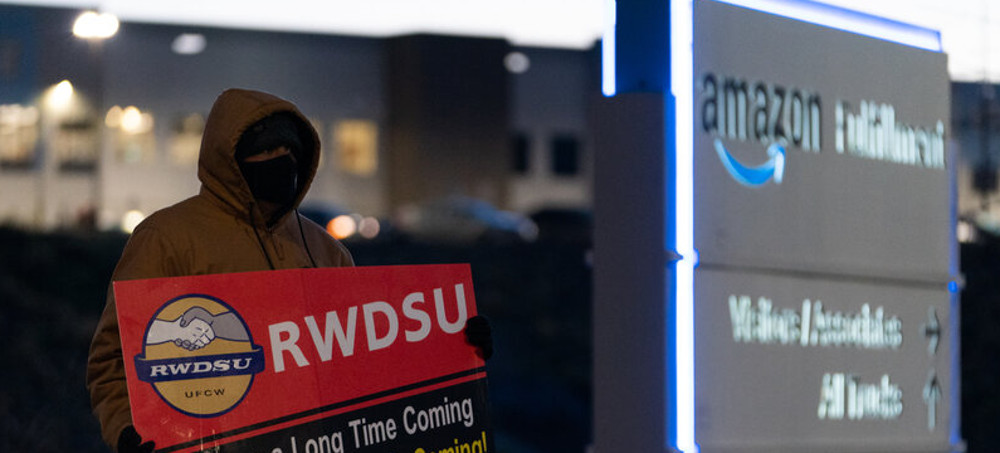 A retail union representative holds a sign by the Amazon warehouse in Bessemer, Alabama, during the first union election in March 2021. (photo: Elijah Nouvelage/Getty)
A retail union representative holds a sign by the Amazon warehouse in Bessemer, Alabama, during the first union election in March 2021. (photo: Elijah Nouvelage/Getty)
ALSO SEE: Amazon Chews Through the Average Worker in Eight Months.
They Need a Union.
Ballots will go out on Friday to more than 6,100 workers at the warehouse in Bessemer, outside Birmingham. They will vote by mail due to the pandemic, and the count is scheduled to start March 28.
The re-vote is a dramatic new chapter in one of the biggest union efforts at Amazon, which has grown into the country's second-largest private employer. It is the second attempt by Bessemer workers, who last spring decisively rejected unionization. They now get to try again after a federal ruling found Amazon unfairly influenced the first election.
"That loss is making us motivated to win even more," Bessemer worker Kristina Bell told reporters on a call organized by the Retail, Wholesale and Department Store Union, which vies to represent Amazon workers.
A few things have changed since last year's election.
Nationwide, the Great Resignation wave swept the economy, punctuated by high-profile strikes and labor campaigns. Among them, Starbucks workers unionized at two locations in New York, prompting union petitions from over 50 other stores across 19 states.
At Amazon, workers at two more warehouses in New York are petitioning for a union. Organizers at one of them have already gathered enough signatures to get a union vote. The push is led by a fledgling labor group of current and former employees, unaffiliated with any professional union.
At the Bessemer warehouse, high turnover means nearly half of the workers will be voting on unionization for the first time. Pro-union workers hope this means a new outcome after last year's landslide loss, in which 71% of voters opposed unionization. Hundreds of employees did not vote in the original election.
Union supporters at the Bessemer warehouse say they now have a much bigger organizing effort, wearing union T-shirts at work, knocking on doors, speaking out more at Amazon's mandatory "information sessions" about unions and staging counter-sessions.
Amazon has fought the union, arguing it isn't necessary.
The company now employs 1.1 million people in the U.S., most of them sorting, picking and packing in the company's vast warehouses. Amazon's minimum wage remains $15 an hour, but during last year's big hiring push, Amazon said its average starting wage topped $18 an hour. The company touts its health and education benefits.
"Our employees have always had the choice of whether or not to join a union, and our focus remains on working directly with our team to make Amazon a great place to work," Amazon spokesperson Barbara Agrait said in a statement.
Under mounting scrutiny for its worker policies, Amazon in December reached a settlement with the National Labor Relations Board aimed at making it easier for employees to organize. The deal required Amazon to notify hundreds of thousands of workers about their labor rights.
The company faces several charges of unfair labor practices, which the company rejects. Most recently, a pro-union worker in Bessemer has accused Amazon of surveilling him and giving him a warning over his organizing work. At the Staten Island warehouse, the NLRB itself has accused Amazon of illegally threatening, interrogating and surveilling workers.
The Bessemer union push has garnered nationwide attention.
At first, the labor organizing appeared to take Amazon by surprise. Historically, unions are a tough sell in Southern states such as Alabama.
Only months after Amazon's warehouse opened in Bessemer, some workers quietly reached out to the retail union. The pandemic was fast spreading and shoppers increasingly turned to Amazon. Workers described grueling productivity quotas and wanted more say in how employees at the company work, get disciplined or get fired.
The Bessemer union vote became Amazon's first since 2014, when a small group of Delaware workers voted against unionizing. At a time when the U.S. union membership is at historic lows, the high-profile campaign at a booming major employer drew big-name supporters: President Biden, Sen. Marco Rubio, actor Danny Glover and other politicians and celebrities.
But a unionization effort targeting thousands of workers in a workplace with rapid turnover run by one of the world's most valuable and staunchly anti-union corporations could take years and multiple elections, labor experts said.
"To win an NLRB election is kind of like a marathon in a minefield for union supporters," said John Logan, director of labor and employment studies at San Francisco State University. "It takes an incredible length of time."
One unexpected controversy has been about a mailbox.
When the NLRB ordered a re-do of the Bessemer union election, the officials ruled that Amazon's anti-union campaign tainted the results. One key reason had to do with a mailbox that the U.S. Postal Service installed in the warehouse parking lot at Amazon's request.
By doing that, Amazon "essentially highjacked" the election, the NLRB's order said. Though the company argued its intent was to make voting convenient, workers testified that a mailbox inside an Amazon tent next to their highly surveilled workplace made them feel that their employer was monitoring the vote.
The NLRB directed the USPS to move the mailbox to "a neutral location" on Amazon's property, and it got placed farther from the building in a different parking area. Last week, the union asked the NLRB to remove the mailbox altogether, arguing no Amazon property could be neutral.
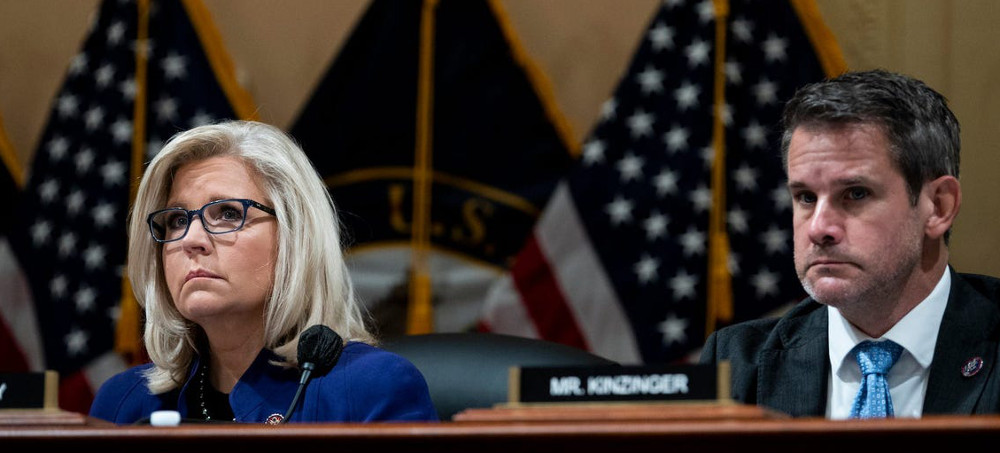 Rep. Liz Cheney, vice-chair of the select committee investigating the January 6th attack on the Capitol, and Rep. Adam Kinzinger. (photo: Tom Williams/Roll Call)
Rep. Liz Cheney, vice-chair of the select committee investigating the January 6th attack on the Capitol, and Rep. Adam Kinzinger. (photo: Tom Williams/Roll Call)
The RNC is about to label the Jan. 6 investigation a “persecution of ordinary citizens” as it censures Reps. Liz Cheney and Adam Kinzinger.
The RNC has a planned vote to censure Wyoming GOP Rep. Liz Cheney and Illinois GOP Rep. Adam Kinzinger, the two Republicans who bucked their party and joined the House Select Committee investigating the causes of the Jan. 6, 2021, attack on Congress.
“Representatives Cheney and Kinzinger are participating in a Democrat-led persecution of ordinary citizens engaged in legitimate political discourse,” the resolution reads.
That can’t be much more explicit: The GOP’s official position is now that any investigation into how former President Donald Trump and his allies attempted to overturn the 2020 election, and the connection between that and the violent riot of Trump supporters who overran the Capitol and injured more than 140 policemen, is simply an attempt to “sabotage” Republicans’ chances in the midterm election. And anyone who supports those efforts will be punished.
The resolution comes just days after Trump declared that he would consider pardoning those convicted of crimes on Jan. 6 if he becomes president again.
It’s also telling who wrote the resolution: Citizens United President David Bossie—a top adviser to Trump who the former president initially put in charge of disputing his loss after the 2020 elections.
Bossie ended up stepping aside for a time because he got COVID, giving Rudy Giuliani and his crew free rein, but was reportedly still involved in the plot to try to overturn Trump’s election loss. He was at a Jan. 5 meeting at the Willard Hotel focused on “how to put pressure on more members of Congress to object to the Electoral College results,” as one attendee told the New York Times. Others at that meeting included Giuliani, Mike Lindell, and Michael Flynn.
The RNC also changed its rules this week to allow it to fund Cheney’s primary challenger, former RNC Committeewoman Harriett Hageman—ending a longstanding policy of supporting GOP incumbents. Bossie’s original resolution called for Cheney and Kinzinger to be kicked out of the GOP, but that was watered down to a censure resolution by an RNC subcommittee before it unanimously passed this resolution on Thursday evening. The full RNC membership is expected to approve the resolution on Friday.
This shouldn’t come as a shock: As VICE News previously reported, a large number of Republican state party chairs and RNC committee members have publicly supported Trump’s election lies and other even wilder conspiracy theories. The party apparatus has been mostly seized by pro-Trump activists, and this vote reflects that.
Cheney fired back at the resolution.
“The leaders of the Republican Party have made themselves willing hostages to a man who admits he tried to overturn a presidential election and suggests he would pardon Jan. 6 defendants, some of whom have been charged with seditious conspiracy,” Cheney said in a Thursday statement. “I’m a constitutional conservative and I do not recognize those in my party who have abandoned the Constitution to embrace Donald Trump. History will be their judge. I will never stop fighting for our constitutional republic. No matter what.”
Cheney has already lost her leadership position and is facing a tough primary challenge. Kinzinger opted to retire rather than face a steep uphill fight for reelection.
But this resolution shows that many in the GOP don’t think they’ve been punished enough. And it’s a strong signal of exactly how much control Trump and his allies have over the Republican Party.
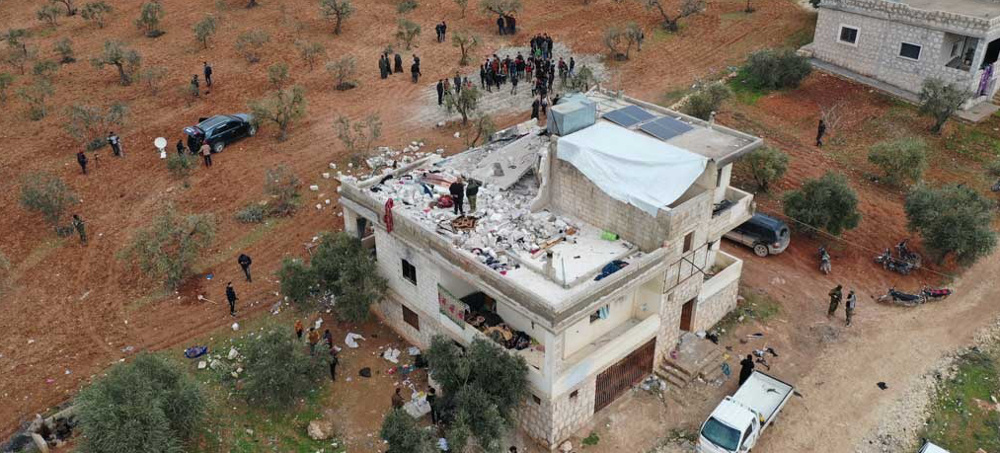 A Special Operations raid killed Islamic State leader Abu Ibrahim al-Hashimi al-Quraishi in northern Syria. (photo: Getty)
A Special Operations raid killed Islamic State leader Abu Ibrahim al-Hashimi al-Quraishi in northern Syria. (photo: Getty)
Biden’s claim that the world has been made safer by the killing of yet another terrorist leader is hard to credit.
“Last night at my direction, U.S. military forces in northwest Syria successfully undertook a counterterrorism operation to protect the American people and our Allies, and make the world a safer place,” Biden said in a statement early Thursday morning. “Thanks to the skill and bravery of our Armed Forces, we have taken off the battlefield Abu Ibrahim al-Hashimi al-Qurayshi—the leader of ISIS. All Americans have returned safely from the operation.”
The raid on a home where al-Quraishi was staying killed a total of 13 people, including a number of women and children. Images on social media of mangled corpses immediately began circulating in the aftermath, broadcast from the scene by local journalists. The attack came after weeks of violence in northern Syria, where ISIS fighters staged an uprising against members of the Kurdish-led Syrian Democratic Forces that killed hundreds. Initial claims by Biden and other U.S. officials have suggested that the civilians killed in the raid on al-Quraishi’s house died when the ISIS leader chose to detonate his own suicide vest rather than be captured by U.S. forces. Syrian journalists also shared images online of wreckage from a crashed U.S. helicopter, though U.S. officials have echoed Biden’s statement that no Americans were harmed in the operation.
Although al-Quraishi, alongside his family, does appear to be dead, Biden’s claim in his public address that the world has been made safer by the killing of yet another terrorist leader is hard to credit. Since the outset of the Global War on Terrorism over two decades ago, the periodic killings of commanders from groups like the Taliban, Al Qaeda, al-Shabab, and, most recently, the Islamic State in Iraq and Syria have been touted as significant victories and even turning points in America’s so-called war on terror. Despite these repeated tactical victories, from which U.S. presidents have extracted much political capital over the years, the underlying wars themselves have continued and even worsened.
An article in the national security publication War on the Rocks last year highlighted the limits of killing terrorist leaders as a means of strategic victory. “Too often, leadership decapitation is viewed as a panacea, as policymakers tout the removal of high-value targets to suggest a ‘turning point’ that fails to materialize,” noted Colin Clarke, the director of policy and research at the Soufan Group, a security consulting firm. “It is correct to seek to decapitate terrorist organizations, but these are tactical actions, not strategic ones.”
Not much is known about al-Quraishi in comparison with his more notorious predecessor, Abu Bakr al-Baghdadi. An investigation last year by the national security publication New Lines Magazine drew upon Iraqi intelligence files and interviews with individuals who had previously been incarcerated with him to paint a picture of the man who had been quietly holding the reins of ISIS over the past several years. That investigation managed to get some context about his past from personal documentation and also a photo of him while incarcerated by U.S. forces in 2008 at Camp Bucca, a military prison in Iraq. But it is unclear how much power al-Quraishi actually wielded and how important he was to an organization that has been severely diminished by years of brutal fighting. There is little reason to assume that the killing of al-Quraishi will result in anything more than a tactical reorganization of the Islamic State, or even its splintering into other, new extremist groups amid the ongoing misery and chaos of the Syrian civil war. His death is also unlikely to mean an end to the U.S. “forever wars” in the region, which have switched to a permanent mode of militarized policing in which the U.S. reserves the right to carry out bombings and assassinations at will but does not refer to these actions as “war,” even when civilians are killed in the process.
After a long list of failures and defeats, the U.S. public has clearly tired of its conflicts in the Middle East. But despite rhetoric from American leaders about ending the forever wars, they look likely to continue under new definitions and with new tactics. In his remarks announcing the death of al-Quraishi, even Biden refrained from promising a forthcoming end to the conflicts or even a radically transformed security situation for Americans. Though al-Quraishi, a man whom most Americans would likely have been unable to name, is now dead, along with several civilians, the two-decade-long conflict that led to his emergence still continues — with no horizon in sight.
 Flared natural gas is burned off at a natural gas plant. Methane, the main ingredient in natural gas, can leak from natural gas plants and pipelines. (photo: Spencer Platt/Getty)
Flared natural gas is burned off at a natural gas plant. Methane, the main ingredient in natural gas, can leak from natural gas plants and pipelines. (photo: Spencer Platt/Getty)
Methane is the main ingredient in natural gas, the fuel. It's also a powerful greenhouse gas, second only to carbon dioxide in its warming impact. And Thomas Lauvaux, a researcher with the Laboratory of Climate and Environmental Sciences in France, says there's been a persistent discrepancy between official estimates of methane emissions and field observations.
"For years, every time we had data [on methane emissions] — we were flying over an area, we were driving around — we always found more emissions than we were supposed to see," he says.
Researchers turned to satellites in an effort to get more clarity. The European Space Agency launched an instrument three years ago called the TROPOspheric Monitoring Instrument (TROPOMI) that can measure the methane in any 12-square-mile block of the atmosphere, day by day.
Lauvaux says that TROPOMI detected methane releases that the official estimates did not foresee. "No one expects that pipelines are sometimes wide open, pouring gas into the atmosphere," he says.
Yet they were. Over the course of two years, during 2019 and 2020, the researchers counted more than 1,800 large bursts of methane, often releasing several tons of methane per hour. Lauvaux and his colleagues published their findings this week in the journal Science.
The researchers consulted with gas companies, trying to understand the source of these "ultra-emitting events." They found that some releases resulted from accidents. More often, though, they were deliberate. Gas companies simply vented gas from pipelines or other equipment before carrying out repairs or maintenance operations.
Lauvaux says these releases could be avoided. There's equipment that allows gas to be removed and captured before repairs. "It can totally be done," he says. "It takes time, for sure, resources and staff. But it's doable. Absolutely."
The countries where bursts of methane happened most frequently included the former Soviet republic of Turkmenistan, Russia, the United States, Iran, Kazakhstan and Algeria. Lauvaux says they found relatively few such releases in some other countries with big gas industries, such as Saudi Arabia.
According to the researchers, the large releases of methane that they detected accounted for 8-12% of global methane emissions from oil and gas infrastructure during that time.
Steven Hamburg, chief scientist for the Environmental Defense Fund, which has focused on the problem of methane emissions, says these massive releases are dramatic. But it's also important to remember the "ordinary" leaks that make up the other 90% of emissions from oil and gas facilities. "They really matter," he says.
EDF is planning to launch its own methane-detecting satellite in about a year, which will take much sharper pictures, showing smaller leaks. Other organizations are developing their own methane detectors.
That new monitoring network will transform the conversation about methane emissions, Hamburg says. Historically, no one could tell where methane was coming from, "and that's part of the reason we haven't taken, globally, the action that we should. It was just out of sight, out of mind," Hamburg says. "Well, it no longer will be. It will be totally visible."
He thinks that will translate into more pressure on oil and gas companies to fix those leaks.
Follow us on facebook and twitter!
PO Box 2043 / Citrus Heights, CA 95611
Evening Roundup, May 28...plus a special thank you to our Contrarian family
Evening Roundup, May 28...plus a special thank you to our Contrarian family Featuring Jen Rubin, Katherine Stewart, Brian O'Neill, Jenni...

-
01 January 22 Live on the homepage now! Reader Supported News FOCUS: Robert Reich | The Road Ahead Robert Reich, Robert Reich's Su...
-
29 January 22 When You Back RSN You Are Backing Proven Fighters Pressuring the networks, not allowing the real story to go unnoticed, ma...
-
06 October 21 Live on the homepage now! Reader Supported News WHAT’S THE COST OF A CORPORATE INFORMATION MONOPOLY? — Everything? In effect...



